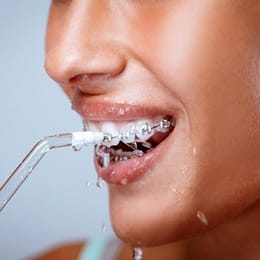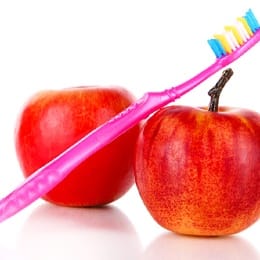Caring for Dental Braces – Huntington, NY
Maintaining Your Braces for a Straighter Smile

Metal braces consist of brackets and wires. When placed on your child’s teeth, it will not only be necessary that they continue with their regular oral hygiene routine to ensure their teeth and gums stay healthy, but it’s also important to keep these metal pieces clean, too. From foods consumed to sports and activities, there are many ways in which braces can be negatively impacted, and as a result, hinder and delay your child’s orthodontic treatment. To prevent this from happening, the team at Huntington Orthodontics will take special care to make sure your child is caring for braces the right way. Call us to schedule an appointment with your child’s orthodontist should you have questions.
Proper Oral Hygiene Techniques

It can take some time adjusting to wearing braces. We know it’s a process that takes time, and each day, your child will need to rethink how they go about taking care of their new metal braces. When waking each morning and before going to bed every night, it’s important that they brush their teeth, floss at least once, and rinse accordingly.
Brushing
When it comes to brushing, they’ll need a soft-bristled toothbrush and fluoride toothpaste, as this will strengthen their tooth enamel and prevent tooth decay from developing. It’s important that the brush is turned at a 45-degree angle and moves in a circular motion. This will not only clean the entire surface of the tooth, but it will also reach the gums and clean the bracket and wire.
If possible, an electric toothbrush makes the cleaning process much easier, as they are able to better reach the smaller areas of your child’s smile. Once they are finished brushing, make sure they rinse well.
Flossing
Instead of reaching for traditional dental floss, your child may find it easier to practice water flossing with the help of a Waterpik. This electric flosser pulsates as water pushes between the teeth, blasting away harmful bacteria and left behind food particles. It is effectively at maneuvering around brackets and wires, which makes it a strongly suggested item to purchase when braces enter the picture.
What Foods Should be Avoided?

Traditional braces usually require a change in diet. Although it’s not necessary to live off liquids or soft foods, there are some food items that should be avoided as much as possible. If a particular food is too hard to resist, find a way to make it easier to consume (i.e. cut into small pieces).
Some of the foods you should avoid include:
- Sticky foods such as gum or caramel
- Hard fruits and vegetables should be cut up into tiny pieces
- Ice
- Hard candies
- Small foods that can easily get stuck in between brackets and wires (i.e. popcorn kernels, sunflower seeds)
- Hard bread, such as rolls or bagels
Problems That Can Occur if Braces Aren’t Properly Maintained

Should your child decide that caring for their braces isn’t necessary, there can be a host of issues that occur as a result, leaving your child’s orthodontist in Huntington working to remedy the problems. Examples of what can happen when braces are properly maintained include:
- Stained teeth – When plaque is allowed to build on teeth, this can cause cavities, as well as swollen gums, bad breath, and stains on the tooth’s surface. Brushing is necessary to remove this type of plaque, in addition to seeing us for regular checkups and cleanings.
- Broken wires – If your child plays sports or is actively engaged in outdoor activities, it’s highly suggested that they wear a sportsguard to protect their braces from damage. It can be custom-made to fit your child’s mouth, ensuring there is plenty of space available for the braces to comfortably fit.
- Gum disease – The same plaque that can cause stains can always develop under the gum line. If the gums become irritated, your child has the early stages of gum disease known as gingivitis. However, if left untreated, it will turn into periodontitis if the plaque turns into tartar and accumulates in your child’s gum pockets.

